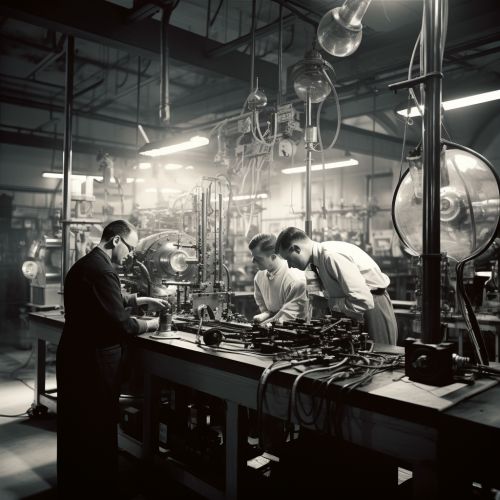Engineering
Overview
Engineering is a broad discipline that involves the application of scientific principles to design and build structures, machines, systems, and processes. It is a field that combines creativity, technical knowledge, and problem-solving skills to develop solutions to complex problems. This field is divided into several sub-disciplines, including civil, mechanical, electrical, and chemical engineering, among others.


History
The roots of engineering can be traced back to ancient civilizations. The Egyptians, for example, developed simple machines like the lever and the pulley, which were fundamental to the construction of their monumental structures. The Greeks and Romans also made significant contributions to engineering, with the latter being particularly renowned for their architectural and civil engineering feats.
The term "engineer" itself comes from the Latin word "ingenium", meaning "cleverness", and "ingeniare", meaning "to contrive or devise". The Industrial Revolution in the 18th century marked a significant turning point in engineering, with the development of steam engines, railways, and large-scale manufacturing.
Principles of Engineering
Engineering is grounded in the principles of mathematics and science. It involves the application of these principles to design and develop solutions to real-world problems. Some of the key principles that guide engineering include:
- Systems Thinking: This involves understanding how different parts of a system interact with each other and the system as a whole.
- Design Thinking: This is a problem-solving approach that involves understanding the user, challenging assumptions, and redefining problems to identify alternative strategies and solutions.
- Ethical Considerations: Engineers have a responsibility to ensure that their work does not harm the environment or society.
Fields of Engineering
There are several fields of engineering, each with its own focus and specializations. Some of the most common fields include:
- Civil Engineering: This field involves the design and construction of infrastructure such as roads, bridges, and buildings.
- Mechanical Engineering: This field involves the design and construction of mechanical systems, including engines and machinery.
- Electrical Engineering: This field involves the design and development of electrical systems and devices, including power generation and distribution systems.
- Chemical Engineering: This field involves the design and operation of chemical processes for large-scale manufacturing.
- Aerospace Engineering: This field involves the design and development of aircraft and spacecraft.


Engineering Education
Engineering education typically involves a combination of theoretical learning and practical application. Most engineering programs require students to complete a series of core courses in mathematics and science, followed by specialized courses in their chosen field of engineering. Many programs also require students to complete a capstone project, where they apply the skills and knowledge they have gained to a real-world engineering problem.
Future of Engineering
The field of engineering is constantly evolving, with new technologies and methodologies continually shaping the way engineers work. Some of the key trends shaping the future of engineering include the rise of automation and artificial intelligence, the increasing importance of sustainability, and the growing demand for engineers with interdisciplinary skills.
See Also
- Engineering Ethics - Engineering Management - Engineering Design Process
